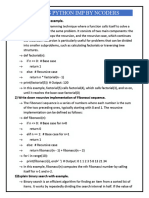0 ratings0% found this document useful (0 votes)
1 viewsTraining CodeTensorflowLite
Uploaded by
20701025Copyright
© © All Rights Reserved
Available Formats
Download as TXT, PDF, TXT or read online on Scribd
0 ratings0% found this document useful (0 votes)
1 viewsTraining CodeTensorflowLite
Uploaded by
20701025Copyright
© © All Rights Reserved
Available Formats
Download as TXT, PDF, TXT or read online on Scribd
You are on page 1/ 2
import numpy as np
import tensorflow as tf
from tensorflow.keras.models import Sequential
from tensorflow.keras.layers import Dense
# Expanded dataset
data = np.array([
[30, 70], [25, 50], [20, 90], [35, 40], [28, 65],
[22, 75], [32, 60], [26, 80], [29, 55], [31, 85],
[24, 45], [27, 70], [33, 50], [23, 85], [34, 65]
])
labels = np.array([80, 50, 90, 20, 70, 75, 60, 85, 55, 95, 45, 70, 50, 90, 65]) /
100.0
# Build the ANN model
model = Sequential([
Dense(16, activation='relu', input_shape=(2,)), # Increased number of neurons
Dense(16, activation='relu'),
Dense(1, activation='sigmoid') # Output rain likelihood (0-1)
])
# Compile the model
model.compile(optimizer='adam', loss='mse', metrics=['mae'])
# Train the model
model.fit(data, labels, epochs=500, verbose=1)
# Save the model
model.save("rain_prediction_model.h5")
from tensorflow.keras.losses import MeanSquaredError
# Explicitly map 'mse' to the MeanSquaredError function
custom_objects = {'mse': MeanSquaredError()}
# Load the model with the custom_objects mapping
model = tf.keras.models.load_model("rain_prediction_model.h5",
custom_objects=custom_objects)
# Convert the model to TensorFlow Lite
converter = tf.lite.TFLiteConverter.from_keras_model(model)
tflite_model = converter.convert()
# Save the TensorFlow Lite model
with open("rain_prediction_model.tflite", "wb") as f:
f.write(tflite_model)
# Read the TensorFlow Lite model file
with open("rain_prediction_model.tflite", "rb") as f:
tflite_model = f.read()
# Write the model to a C header file
with open("model.h", "w") as f:
f.write("#ifndef MODEL_H_\n")
f.write("#define MODEL_H_\n\n")
f.write(f"const unsigned char model[] = {{\n")
# Convert the binary model data to hexadecimal format
for i, byte in enumerate(tflite_model):
if i % 12 == 0: # 12 bytes per line for readability
f.write("\n ")
f.write(f"0x{byte:02x}, ")
f.write("\n};\n\n")
f.write(f"const unsigned int model_len = {len(tflite_model)};\n")
f.write("\n#endif // MODEL_H_\n")
You might also like
- Word2Vec With TensorFlow ©Yousef_DeepDorm_No ratings yetWord2Vec With TensorFlow ©Yousef_DeepDorm_9 pages
- Image_Captioning_with_Visual_Attention.pdfNo ratings yetImage_Captioning_with_Visual_Attention.pdf16 pages
- MalenoV Code 5 Layer CNN 65x65x65 VoxelsNo ratings yetMalenoV Code 5 Layer CNN 65x65x65 Voxels30 pages
- Design A Neural Network For Classifying Movie ReviewsNo ratings yetDesign A Neural Network For Classifying Movie Reviews5 pages
- DL_0801CS223D04_Assignment5.ipynb - ColabNo ratings yetDL_0801CS223D04_Assignment5.ipynb - Colab15 pages
- Ex. No: 1 Exploring The Features of Numpy, Scipy, Jupyter, Statsmodels and Pandas Date: 07/08/2024No ratings yetEx. No: 1 Exploring The Features of Numpy, Scipy, Jupyter, Statsmodels and Pandas Date: 07/08/20249 pages
- Handwritten Character Recognition With Neural NetworkNo ratings yetHandwritten Character Recognition With Neural Network12 pages
- Unit Iv - Python Functions, Modules and PackagesNo ratings yetUnit Iv - Python Functions, Modules and Packages102 pages
- Machine Learning Lecture - 4 and Lecture - 5No ratings yetMachine Learning Lecture - 4 and Lecture - 573 pages
- Medical Text Classifier GabrieldeOlaguibelNo ratings yetMedical Text Classifier GabrieldeOlaguibel12 pages
- MLP Sous Keras: A. MLP Pour Une Classification BinaireNo ratings yetMLP Sous Keras: A. MLP Pour Une Classification Binaire2 pages
- SiddharthShah 1032221195 DivC 50 DL LabAssignment4No ratings yetSiddharthShah 1032221195 DivC 50 DL LabAssignment46 pages
- Machine Learning Lab Record: Dr. Sarika HegdeNo ratings yetMachine Learning Lab Record: Dr. Sarika Hegde23 pages



























































